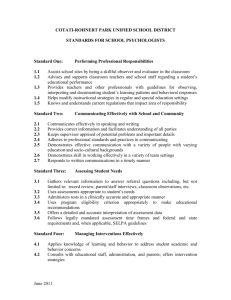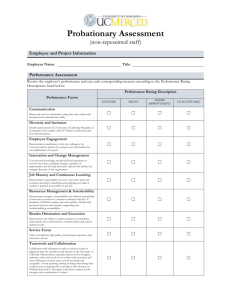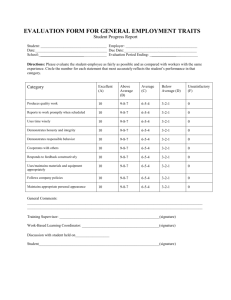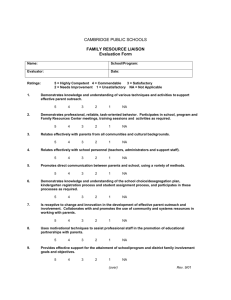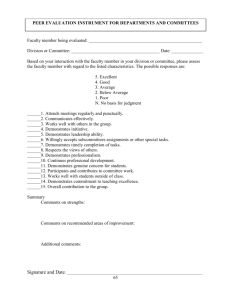EVALUATION CHECKLIST
advertisement
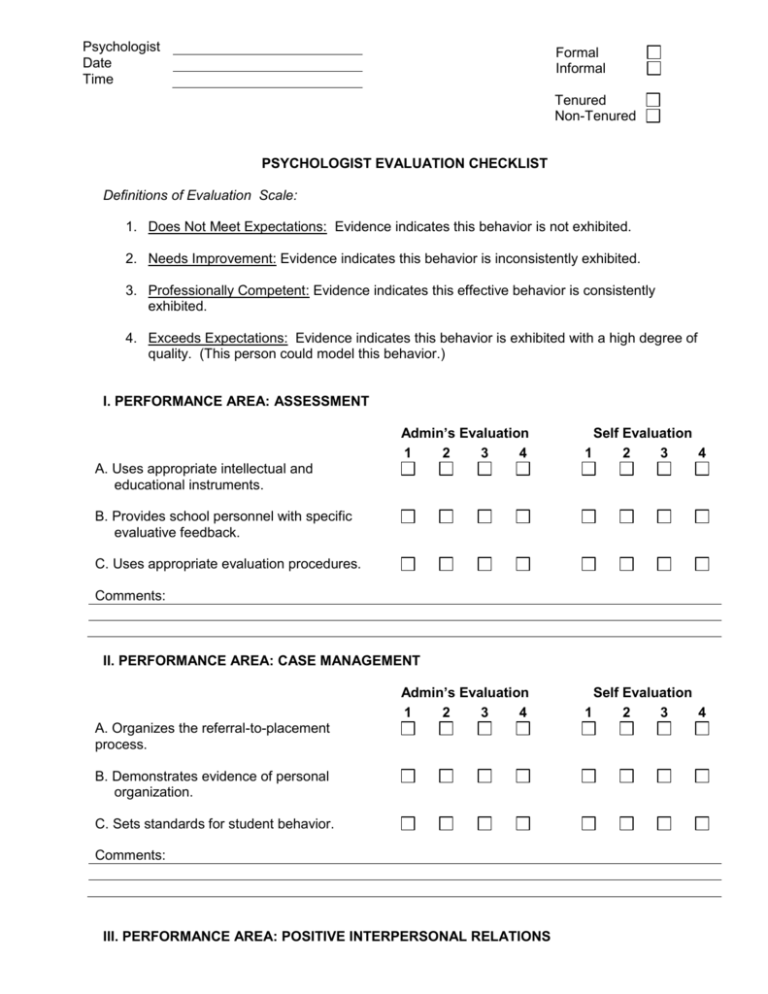
Psychologist Date Time Formal Informal Tenured Non-Tenured PSYCHOLOGIST EVALUATION CHECKLIST Definitions of Evaluation Scale: 1. Does Not Meet Expectations: Evidence indicates this behavior is not exhibited. 2. Needs Improvement: Evidence indicates this behavior is inconsistently exhibited. 3. Professionally Competent: Evidence indicates this effective behavior is consistently exhibited. 4. Exceeds Expectations: Evidence indicates this behavior is exhibited with a high degree of quality. (This person could model this behavior.) I. PERFORMANCE AREA: ASSESSMENT Admin’s Evaluation 1 2 3 4 Self Evaluation 1 2 3 4 A. Uses appropriate intellectual and educational instruments. B. Provides school personnel with specific evaluative feedback. C. Uses appropriate evaluation procedures. Comments: II. PERFORMANCE AREA: CASE MANAGEMENT Admin’s Evaluation 1 2 3 4 A. Organizes the referral-to-placement process. B. Demonstrates evidence of personal organization. C. Sets standards for student behavior. Comments: III. PERFORMANCE AREA: POSITIVE INTERPERSONAL RELATIONS 1 Self Evaluation 2 3 4 Admin’s Evaluation 1 2 3 4 Self Evaluation 1 2 3 4 A. Demonstrates positive interpersonal relations with students. B. Promotes positive self-concept. C. Demonstrates sensitivity in relating to students. Comments: IV. PERFORMANCE AREA: PROFESSIONAL RESPONSIBILITES (This section does not apply for an informal evaluation.) Admin’s Evaluation 1 2 3 4 A. Promotes and engages in professional growth activities. B. Follows school regulations and policies. Comments: Self Evaluation 1 2 3 4 ADMINISTRATOR/PSYCHOLOGIST SUMMARY: PSYCHOLOGIST’S SIGNATURE DATE PRINCIPAL’S SIGNATURE DATE Signature means that the entire evaluation has been reviewed by the psychologist and principal. It does not necessarily mean agreement with the evaluation. PSYCHOLOGIST APPENDIX I. Performance Area A. Criterion 1. Descriptor I. Assessment A. Uses appropriate intellectual and educational instruments. 1. Assesses difficulties of referred students. 2. Administers tests. 3. Recommends placement for all exceptional and new students. 4. Prepares written multidisciplinary team reports. B. Provides school personnel with specific evaluative feedback. 1. Makes opportunities for one-to-one conferences. 2. Encourages two-way communication. 3. Gives meaningful feedback. C. Uses appropriate evaluation procedures. 1. Makes methods of evaluation clear and purposeful. 2. Monitors students as they are evaluated. 3. Ensures compliance with established guidelines. D. Demonstrates knowledge in the area of educational psychology. 1. Explains procedures in context. 2. Relates discussion topics to student’s classroom experiences. 3. Uses a variety of examples and illustrations. II. Case Management A. Organizes the referral-to-placement process. 1. Coordinates the planning of this process. 2. Keeps appropriate personnel informed. 3. Facilitates the work of others. B. Demonstrates evidence of personal organization. 1. Shows evidence of organization of work with objectives clearly in mind. 2. Maintains adequate records. 3. Uses an effective filing system. C. Sets standards for student behavior. 1. Establishes and communicates parameters of behavior. 2. Creates a climate in which students assume personal responsibility for their behavior. III. Positive Interpersonal Relations. (This section does not apply for an informal evaluation.) A. Demonstrates positive interpersonal relations with students. 1. Has positive relationships with students, individually and in groups. 2. Provides a climate for open communication. B. Promotes positive self-concept. 1. Provides opportunities for students to achieve recognition. 2. Promotes positive self-image. 3. Provides opportunities for students to meet success regularly. C. Demonstrates sensitivity in relating to students. 1. Makes an effort to know students as individuals. 2. Is a willing listener. 3. Communicates effectively with students. IV. Professional responsibilities. (This section does not apply for an informal evaluation.) A. Promotes and engages in professional growth activities. 1. Assists with inservice of school personnel. 2. Conducts appropriate research. 3. Keeps abreast of new developments in the field. B. Follows school regulations and policies. 1. Complements duties as assigned. 2. Strives to stay informed regarding regulations and policies applicable to his/her position. 3. Selects appropriate channels for resolving concerns/problems.
